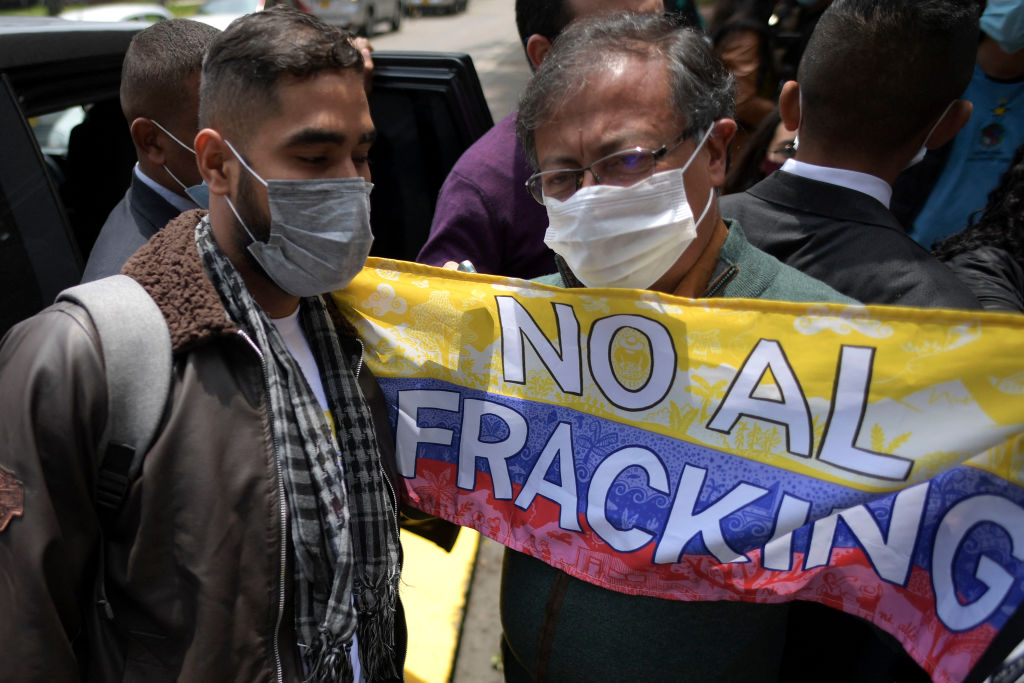How to balance combating the climate crisis with the need to preserve access to affordable energy? Right now, countries around the world are confronting this problem in earnest, as a determination to replace Russian fuels in Europe and push down gasoline prices in most countries clashes with a desire to cut emissions. Recent steps meant to ensure cheaper energy now show that energy security—and fuel affordability—remain the overriding priorities of governments.
Latin America is little different, as governments bow to popular pressure to keep gasoline prices low. In Ecuador, President Lasso had to lower prices even further to survive a wave of street protests. And in Colombia, the outgoing government has been unable or unwilling to raise gasoline prices. Consumers are paying a mere one-half of the international market price.
Against this fraught international background, there’s an ongoing debate over oil production and exploration in Colombia. President Gustavo Petro has pledged to ban fracking and stop issuing new permits for oil exploration, citing the need to reduce Colombia’s dependence on fossil fuels and extractive industries. The goal is to build an environmentally-friendly economy.
But does it make sense for Colombia to stop producing oil while there’s still ample global demand? And will doing so reduce global carbon emissions? That’s unlikely. The probable outcome is that other oil-producing countries will simply fill the gap in production, leaving Colombia without badly needed oil revenues. In fact, most countries in the region are moving in the opposite direction. Increases in oil production are national goals in countries as diverse as Brazil, Mexico, Guyana, Suriname and Ecuador. Venezuela too is trying to raise production with the implicit support of the United States.
Decreasing demand will do far more to cut emissions than attempts to reduce supply. The best strategy to combat climate change is to generate energy from renewable sources and electrify transport and industrial processes. This is what countries like Chile and Uruguay have been doing with great success. More recently, Colombia has taken steps in this direction by making Bogotá the city with the largest fleet of electric buses in Latin America and reducing the use of fossil fuels to generate electricity. Reducing demand for fossil fuels does a lot more to cut emissions than cutting oil production, at least for now. The reason is clear: If there is less demand, oil prices will naturally fall and fewer barrels will be produced.
Gustavo Petro should rethink his energy transition strategy. His plans to reduce exploration activities should not be approved. Colombia has very limited oil reserves, so without new exploration, oil production will fall fast and soon. As this will happen well before the energy transition significantly reduces the demand for oil, Colombia will need to import oil. This does not make sense from an economic point of view, given that the country has potential reserves. Colombia would lose revenues that are fundamental to pay for social inclusion.
Reducing deforestation—rather than producing less oil—is the most important contribution the region can make to tackling the climate crisis. For this, the country needs to put in place an aggressive strategy to develop a market for carbon offsets and use the proceeds to ensure reforestation and provide adequate living standards to the population that engages in deforestation, given a lack of adequate opportunities.
—
Cárdenas is a senior research scholar at the Center on Global Energy Policy at Columbia University. He was finance minister of Colombia from 2012 to 2018 and is a member of AQ’s editorial board.








